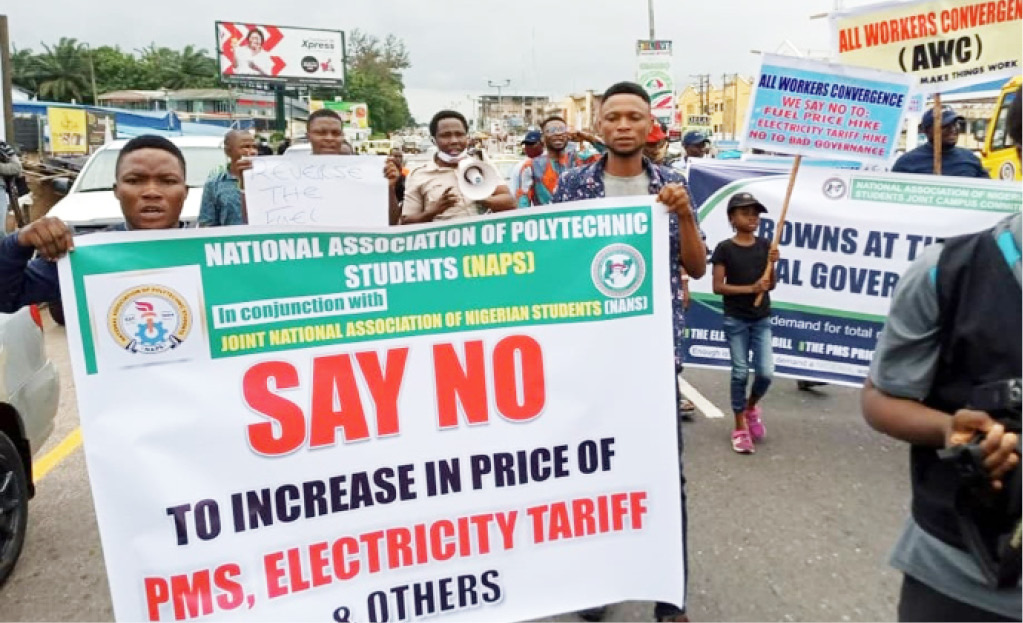No one knows for certain what little incident or public policy would trigger mass outrage.
No one, for instance, foresaw that a Tunisian street vendor, Mohammed Bouazizi’s altercation with municipal officials and his subsequent self-immolation would trigger that country’s revolution and the wider Arab Spring, which toppled several strongmen who have ensconced themselves in power for decades.
Borno police bars all protests against price hikes
Protest rocks South west states over fuel price, electricity tariff hikes
Not many people assumed that rising bread prices in France, in 1792, would trigger the French Revolution that would result in King Luis XVI’s head being harvested by a guillotine.
Of course, it would be simplistic to say the French Revolution was caused by just the rising prices of bread.
The extravagant spending of the king and his predecessor, which bankrupted the country, two decades of poor harvests and a crippling cattle disease, fostered resentment for the monarchy.
But when the history of the French Revolution is told, it is often highlighted by the ostentatious living in the gilded palace of Versailles and the thick-skinned policies coming from within its chambers.
Recent policies from Aso Rock bear some striking, disturbing similarities to those that tumbled out of the Versailles in those days.
In the week the president’s daughter had an ostentatious wedding (and one should not begrudge Hannan a beautiful wedding, as all people deserve one) the government increased both petrol pump price and electricity tariffs.
By May 29, 2015, when this government came into power, (and I use that word deliberately) fuel cost N87 per litre.
The staggered increase in the prices from 87 to 145, and then 158 and now 160, or whatever the marketers decide, is contrary to everything Buhari had promised during his campaigns.
In January 2015, Buhari, through his campaign organisation, issued a strongly worded critique of then President Jonathan, demanding immediate reduction of pump prices.
What has changed?
Well, for one, Buhari is not the same man (of course by this I do not mean I subscribe to Nnamdi Kanu’s nonsensical Jubril from Sudan theory).
But this Buhari was not the same retired general who in 2011 inside a packed International Conference Centre, in the sweltering Abuja heat, broke down and wept over the suffering of Nigerians and the woes of the country.
He is not the same man who, in a billowing black kaftan and sunshades, had marched Abuja streets protesting the killings of innocent Nigerians, raging against the government “playing politics with Boko Haram.” He is not the same man.
He is president now.
The disconnect between him and his supporters—the okada riders who chipped in their hundred naira tokens to fund his campaign, and gave their lives protecting his votes, the rich politicians who made their private jets and deep pockets available, and Hajiya Fati Koko Mai Talle Tara who waited for nine, long hours in Kebbi to donate her million naira life savings to Buhari’s campaign—has never been wider.
Perhaps their naivety should be viewed in the context that they, in fact, believed that this would be the president who genuinely cares about the people and will selflessly work to fix this country.
They have been rewarded with one who, sadly, has become adept at ignoring the people and their plights.
The decision to completely deregulate the downstream of the oil sector equates to hurling Nigerians to the wolves.
Now pump prices are going to be determined by market forces (and we may see prices double in the next few weeks).
What this actually means is that the government that promised and failed to protect Nigerians from Boko Haram and bandits, will no longer make any pretence at protecting Nigerians from the market forces that already have them boxed into a corner.
One thing the government fails to realise, and I suppose this is an affliction anyone who occupies Aso Rock suffers from, is that policies are not implemented on paper but in the lives of real people.
For a country whose minimum wage is N30,000, (something state governments reluctantly agreed to pay only recently), where more than 82 million people live on less than a dollar a day, where there is no functional public transport system and insecurity is rife, it is simply inhumane to expose these people to the vagaries of capitalist wolves.
Yet apart from some listless protests in some cities, most Nigerians are too tired to dissent, too hungry to pound the streets, too disillusioned to rage and raise their voices.
The persistent application of doses of government insensitivity to the populace over years of misrule has reached a point where Nigerians are almost numb and now witness this callousness as an out-of-body experience.
Many people who have been so tortured have even reported drifting, their minds travelling to far more pleasant places, to blue springs in magical groves and beaches with gentle waves kissing the shores, while their bodies suffer.
Correspondingly, Nigerians take comfort in little things, like European football and Big Brother Nigeria, doing irrational things like raising $15,000 for an evicted housemate when there are more pressing and humane needs at hand. It is their opium.
It makes sense only in the sense that there will always be an audience for inanity, especially when we are so tired of being an audience and victim of our own (self-inflicted) misery.
We are too tired to find the voice to ask: where is the Buhari who wept for Nigeria in 2011?

 Join Daily Trust WhatsApp Community For Quick Access To News and Happenings Around You.
Join Daily Trust WhatsApp Community For Quick Access To News and Happenings Around You.


